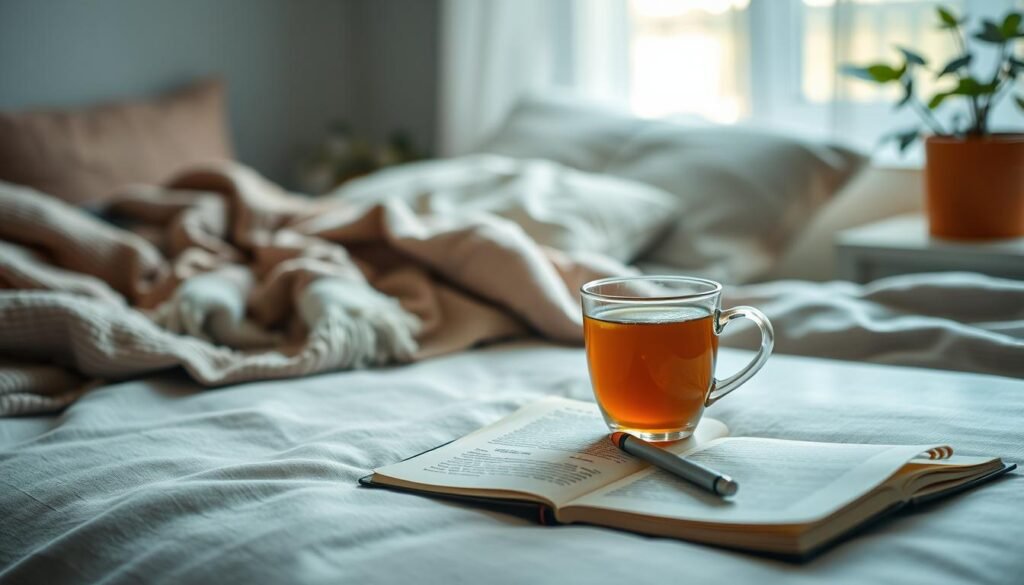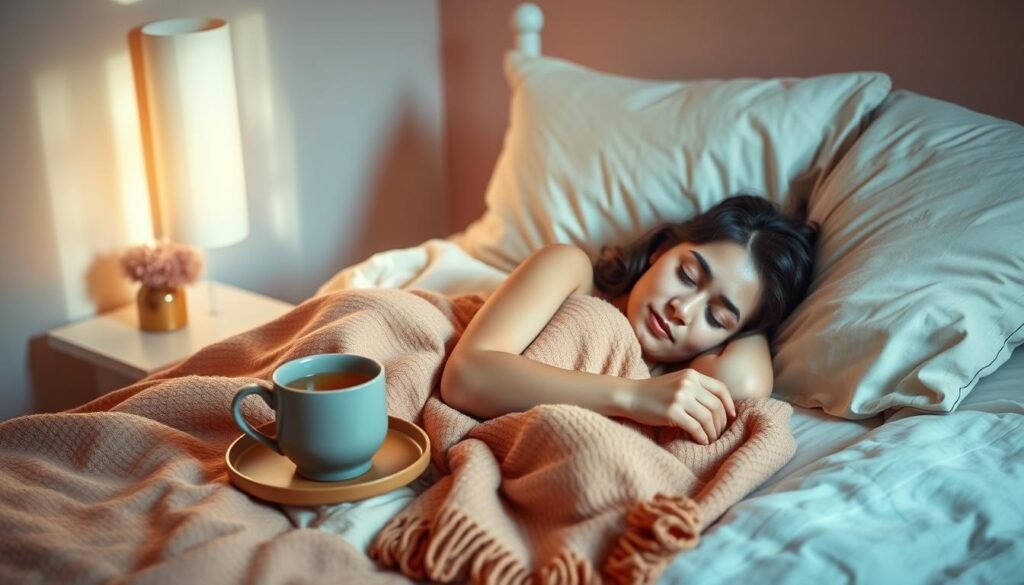Did you know 50% to 80% of people feel tired during a certain phase of their cycle? This phase, called the luteal phase, is between day 15 and day 28 of a 28-day cycle. Hormonal changes can make you feel very sleepy during this time. So, it’s important to learn why this happens and how to feel more energetic.
Hormones are mainly to blame for feeling tired after your period. But low iron levels—something 30% of women face—can make you feel even more exhausted. Knowing the signs of this fatigue is the first step to feeling better.
In this article, we’ll look at why you feel so tired and share ways to get your energy back. We want to help you feel good again.
Key Takeaways
- Fatigue during the luteal phase affects up to 80% of menstruating individuals.
- Hormonal shifts, particularly progesterone, are linked to increased tiredness.
- Iron deficiency can worsen post-menstrual fatigue, impacting energy levels.
- Maintaining a balanced diet can help diminish fatigue symptoms.
- Staying hydrated is essential in combating feelings of lethargy.
- Adequate sleep is crucial for energy recovery after menstruation.
Understanding Fatigue After Your Period
Many women feel tired after their period. Hormonal changes are a big reason for this. Knowing why can help manage and lessen this fatigue.
What Causes Post-Menstrual Fatigue?
Several factors make you feel tired after your period. Changing hormone levels, like estrogen and progesterone, affect your energy. After menstruation, these hormone levels are at their lowest, making you feel exhausted.
The Role of Hormonal Changes
The menstrual cycle lasts about 28 days, going through several phases. Your energy can vary a lot during these times. Especially during the luteal phase, when progesterone goes up, and estrogen goes down, you might feel low energy and mood.
This phase is tough and can cause different symptoms, including fatigue.
Iron Deficiency and Heavy Menstrual Bleeding
Heavy periods can make fatigue worse by causing iron deficiency anemia. Lower hemoglobin levels affect your body’s energy. This makes it hard to bounce back from menstrual tiredness.
Eating foods rich in iron may help reduce some of this fatigue after your period.
Signs and Symptoms of Fatigue Following Menstruation
Knowing how you feel after your period is key to looking after your health. Many feel post-menstrual fatigue symptoms that can be simple tiredness or very draining exhaustion. It’s important to tell the difference between normal fatigue and extreme tiredness. This helps you take care of yourself and know when you need medical advice.
Recognizing Post-Period Tiredness
After your period, you might notice several post-menstrual fatigue symptoms. Common signs include:
- General tiredness and weakness
- Difficulties in concentrating
- Emotional fluctuations, including irritability
- Sleep disturbances
- Increased sensitivity to stress
These signs of fatigue after period can really affect your day and how you feel. Noticing these symptoms early can help you start getting better sooner.
Differentiating Between Normal Fatigue and Severe Exhaustion
Usually, you can feel better from normal fatigue with some rest. But severe exhaustion can really change your life. Signs that it might be severe exhaustion include:
| Symptoms | Normal Fatigue | Severe Exhaustion |
|---|---|---|
| Duration | 1-3 days | More than a week |
| Response to Rest | Partially improved | No improvement |
| Impact on Daily Life | Minor | Significant |
| Associated Feelings | Occasional frustration | Persistent sadness or anxiety |
If your symptoms don’t go away or get worse, it’s wise to see a doctor. This way, you can check if there’s a health problem causing your severe exhaustion.

Effective Tips to Overcome Post-Menstrual Fatigue
Overcoming post-menstrual fatigue takes some lifestyle changes. Adding an energy-boosting diet, drinking plenty of water, and exercising regularly improves energy levels and well-being.
Maintaining a Balanced Diet
Eating a balanced diet is key to fight fatigue. Including foods high in iron and nutrients helps restore what was lost during menstruation. Eating smaller, frequent meals keeps your energy up and tiredness down. It’s also important to skip high-sugar and processed foods, as they may cause energy levels to crash.
The Importance of Staying Hydrated
Drinking enough water is crucial to fight fatigue. Aim for 8-10 glasses a day to ease symptoms of post-menstrual fatigue. Staying hydrated helps your body run smoothly and boosts energy. Adding hydrating fruits and veggies to your meals can also help with hydration.
Incorporating Regular Exercise
Exercise is a vital part of overcoming post-menstrual fatigue. Low-intensity activities, like walking or yoga, can cut down fatigue by about 30%. These exercises release endorphins, making you feel energized and happier. Making these activities a regular habit can greatly help with menstrual fatigue recovery.

For more information on handling menstrual symptoms, check out professional resources for guidance.
The Connection Between Sleep and Menstrual Fatigue
Sleep is key in fighting menstrual fatigue. Many women find it hard to sleep well during their period. This is especially true in the luteal phase when hormones mess up sleeping patterns. Good sleep habits make a big difference in feeling better and less tired when on your period.
Healthy Sleep Habits to Adopt
There are ways to sleep better and feel less tired during your period:
- Maintain a regular sleep schedule, with about 7.5 hours of good sleep every night.
- Limit time looking at screens before going to bed to improve sleep quality.
- Try calming activities like reading or gentle yoga to get ready for sleep.
- Watch how much caffeine you have, especially in the evening, as it can keep you awake.
Creating a Restful Sleep Environment
Having the right place to sleep is important for good sleep. Things that help include:
- Keeping your bedroom at a cool temperature, around 60-67°F, helps with better sleep.
- Reduce noise and light, maybe with earplugs or blackout curtains.
- Pick a comfy mattress and pillows that you like.
If sleep and menstrual fatigue are issues, look at your sleep space. Getting enough rest helps with health. If problems continue, talking to a doctor is a good idea. They can check for issues like iron deficiency anemia or thyroid problems.

Natural Remedies for Period-Related Fatigue
Are you looking for natural ways to beat period fatigue? Many natural remedies have shown promising results. These include supplements and herbal treatments. They can easily become part of your daily routine. By trying these strategies, you could boost your well-being during your period.
Supplements to Consider for Energy Boost
Adding energy-boosting supplements to your diet can help reduce fatigue. Here are some key supplements to consider:
- Iron Supplements: If you bleed heavily during your period, eating iron-rich foods is a must. It helps prevent anemia.
- Calcium: Aim for 1,200 mg of calcium daily. It’s important for alleviating physical menstruation symptoms.
- Vitamin E: Taking 400 IU of Vitamin E each day can ease cramping pains.
- Vitamin B-6: Between 50 and 100 mg can boost energy, reduce irritability, and improve sleep.
- Magnesium: At a dose of 360 mg, magnesium can lessen breast soreness and bloating.
Herbal Treatments and Alternative Therapies
Herbal treatments for menstrual fatigue are a great natural option. They can help manage symptoms. Here are some noteworthy herbs:
- Ginkgo Biloba: Taking 40 mg three times daily may lessen PMS symptoms like fatigue.
- Evening Primrose Oil: Doses of 500 to 1,000 mg daily can reduce cramps for many people.
- Ginger: Known for its anti-inflammatory effects, ginger can cut down menstrual pain and boost energy.
- Maca Root: This herb is known to increase energy in about 80% of users over time.
- Chasteberry: Many find that this herb helps balance hormones, leading to more energy after regular use.
Want to learn more about fighting menstrual fatigue? Check out this resource for detailed insights.
| Supplement | Recommended Dose | Benefits |
|---|---|---|
| Iron | Based on individual needs | Combats anemia due to heavy bleeding |
| Calcium | 1,200 mg | Reduces physical and emotional symptoms |
| Vitamin E | 400 IU | Relieves cramping pain |
| Vitamin B-6 | 50-100 mg | Enhances energy and reduces irritability |
| Ginkgo Biloba | 40 mg, three times daily | Lessens PMS symptoms |
Seeking Medical Help: When to Consult a Doctor
If you keep feeling tired after your period, it’s time to see a doctor. This is especially true if you’re too exhausted to do everyday things. Fatigue can signal that something else is wrong health-wise.
Identifying Underlying Health Conditions
Some women feel tired because of certain health issues. Important ones include:
- Iron deficiency anemia: Heavy bleeding during your period can lead to serious blood loss and drop your iron levels.
- Thyroid issues: Hypothyroidism can make you feel tired and mess with your periods. Doctors need to check this.
- Polycystic ovary syndrome (PCOS): This hormonal problem can cause irregular periods and tiredness.
Common Medical Tests for Diagnosing Fatigue Issues
To figure out why you’re tired, doctors might suggest some tests. These tests help find the cause of your fatigue. The common ones include:
| Test Type | Purpose |
|---|---|
| Blood tests | Evaluate iron levels, thyroid function, and hormone levels to identify potential deficiencies or disorders. |
| Pelvic ultrasound | Look for problems in the reproductive organs that may affect periods. |
| Progesterone challenge test | Determine hormone balance to figure out issues with periods or abnormal cycles. |
Feeling tired all the time, along with other strange symptoms, means you should see a doctor. It’s important to find out what’s causing it to treat it right.
Lifestyle Changes to Prevent Future Fatigue After Periods
To prevent fatigue after your period, make some lifestyle changes. Knowing how to manage stress and keep a routine helps keep energy levels even. This leads to better well-being overall.
Building a Consistent Routine
Having a consistent routine is key for your energy. Set a daily schedule with regular sleep, meal times, and exercise. This balance helps your body’s rhythms. Adding small, doable goals makes sticking to this routine easier, boosting your energy over time.
The Impact of Stress Management Techniques
Managing stress well is crucial for less fatigue during your period. Mindfulness, yoga, and aerobic exercises lower stress hormones, making you feel more energized. Taking time for self-care and relaxation brings balance and stops fatigue from getting worse.
| Technique | Description | Benefits |
|---|---|---|
| Mindfulness Meditation | A practice of focusing on the present moment. | Reduces anxiety and promotes relaxation. |
| Regular Exercise | Incorporating aerobic exercises like running. | Enhances energy levels and alleviates fatigue. |
| Consistent Sleep Schedule | Going to bed and waking up at the same time daily. | Improves sleep quality and reduces tiredness. |
| Balanced Nutrition | Focusing on light, nutritious meals with protein and complex carbs. | Helps maintain energy levels and reduces fatigue. |
Adding these lifestyle changes for menstrual fatigue makes a big difference. It balances activity with rest and manages stress well. This way, you’re set on a path to less post-menstrual fatigue and better health.
Maintaining Energy Levels After Your Period
After a menstrual cycle ends, many women deal with relaxation and fatigue issues. This affects their energy. Using mindfulness techniques can help regain vitality. Yoga and meditation are key in fighting post-menstrual tiredness and boosting energy.
Practicing Mindfulness and Relaxation Techniques
Mindfulness techniques benefit emotional and physical health. They help fight off fatigue after menstruation. Methods like yoga, meditation, and progressive muscle relaxation are effective.
- Yoga: This exercise stretches the body, promotes relaxation, and eases tension.
- Meditation: Spending a few minutes daily on deep breathing and reflection centers the mind. It clears stress and increases energy.
- Progressive Muscle Relaxation: By tensing and relaxing muscle groups, this method reduces physical stress. It promotes better energy flow.
Adding these practices to your daily routine helps keep energy up after your period. Regular mindfulness and relaxation methods offer vital support. They bridge the gap from the end of menstruation to full energy recovery.
Conclusion
Fatigue after periods is common among women. It’s often due to hormone changes, lifestyle, and what we eat. Knowing why it happens helps us beat it. Key steps include a nutritious diet, staying active, and keeping hydrated for energy.
Sleep and stress greatly impact tiredness too. Many studies show how hormones change through your cycle. This affects tiredness linked to ovulation and PMS. A healthy lifestyle and managing stress well can boost your energy levels. More on this can be found in strategies like the ones at this helpful resource.
To feel better after your period, it’s important to understand what causes the fatigue. Try the tips we talked about for better health. If you’re always tired, it might be time to see a doctor. Taking care of yourself and knowing what your body needs are the first steps to overcome fatigue and handle daily life.